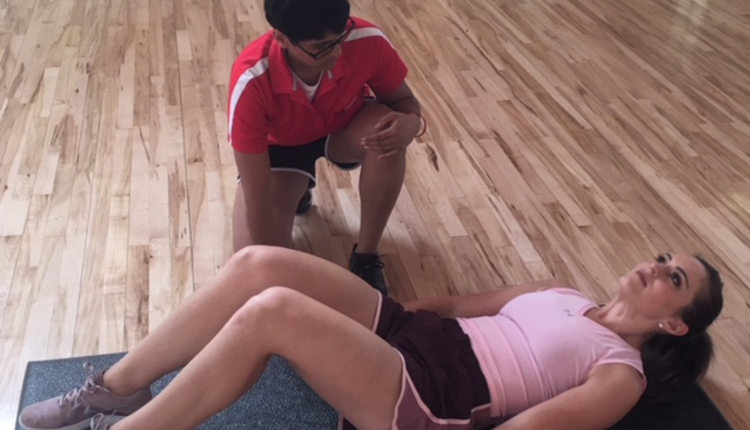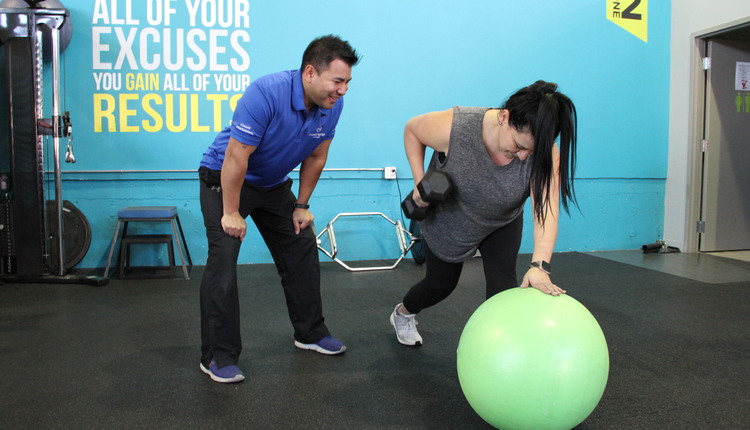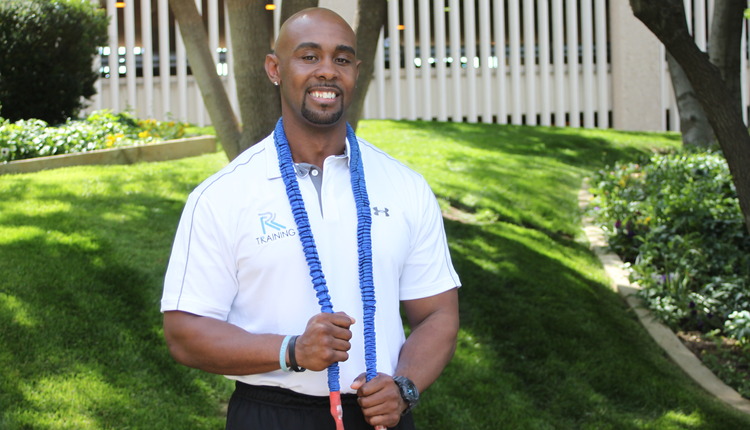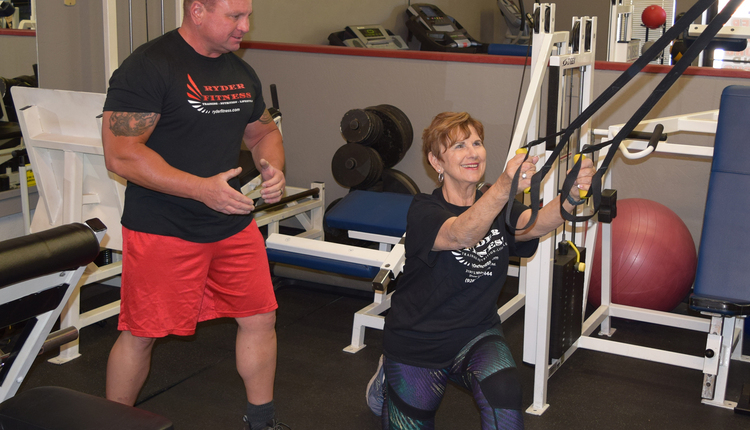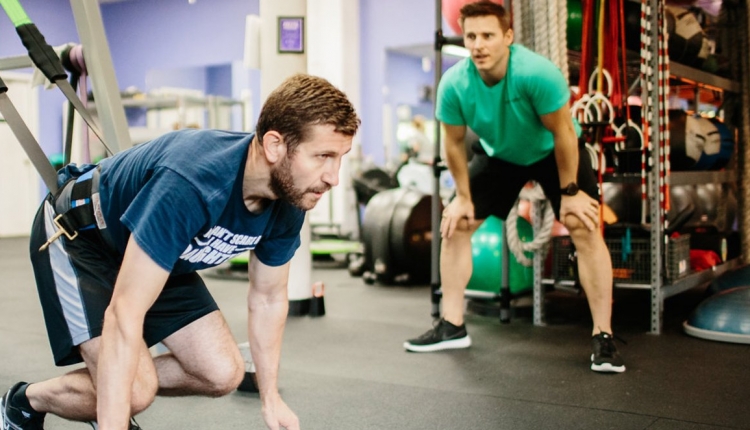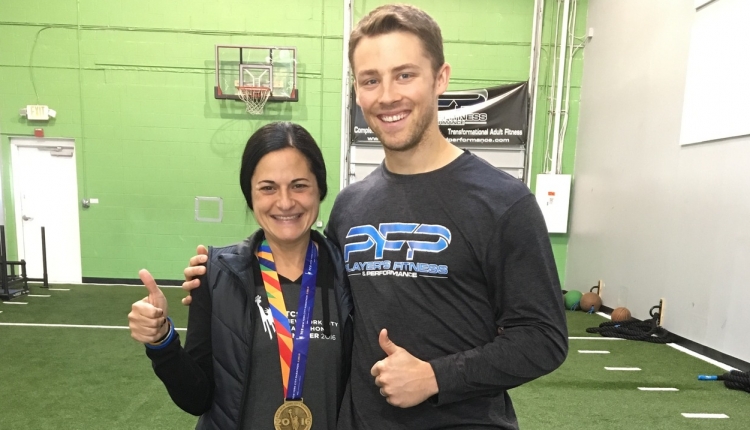It started one day with flashing lights. It seemed to Daryl Kucera that the florescent overhead lights in his office at the credit card company he was working at needed changing because the bulbs were blinking on and off . He asked an assistant to change the lights. "Why?" she asked. Kucera said because the blinking was giving him a headache, to which she responded, "What blinking?"
Things had been stressful lately in Kucera's life. He had opened Fast Forward not even a month earlier to give the youth of Omaha, Nebraska a place to train for the ever-increasing demands of competitive youth sports. He had a family and two jobs, working at Fast Forward part-time as the only trainer while being employed as director of credit risk. Add the fact that September 11, 2001 occurred two weeks prior, along with the uncertain future of the economy, and Kucera had plenty of reasons to believe blinking lights were nothing more than a symptom of uncertainties.
But the blinking soon turned into blurred vision -- then complete loss of sight within days. Kucera says his vision went black, like 1950s model television when it is powered down: The corners went black, and the picture was narrowed to an ever-shrinking circle in the middle, until it disappeared completely.
Daryl Kucera was diagnosed with multiple sclerosis.
The Defining Moment
Kucera says he was angry... and scared. Every aspect of his life was now uncertain as he faced a progressive disease that threatened to erode all that he was building. Every doctor and health professional told Kucera to cut his losses and shut down his business. Some even recommended that he settle for a life of social security disability income.
Even though Kucera understood that MS would change his life, he didn't want to be defined by it. He closed Fast Forward for 45 days while he regrouped, regained his sight and made a plan. He reopened his gym and hired a part-time trainer. A small clientele began to build.
The particularly cruel part of MS, however, is that a "hit," or a sudden and significant progression of the disease, can happen out of the blue. Four months after reopening Fast Forward, Kucera suddenly became totally paralyzed on his right side.
"This was a defining moment for me," remarks Kucera. "Rather than lying immobile in my house, my wife pushed me into our gym in a wheelchair. Unable to move even a pound, I began a three-time-a-week program and built up my strength. Within three months, I was bench-pressing 200 pounds and had regained approximately 80% of my right-side capabilities."
Fast Forward had closed again while Kucera rebuilt his functionality and proved to himself, despite cautions from skeptical doctors who believed that strength training or any strenuous activity may exacerbate MS.
In March 2002, Fast Forward opened again just in time to hold youth summer camp but also to begin evaluating the possibility of creating an exercise program specifically for MS.
"I began meeting with neurologist, physical therapists and the National MS Society about starting an exercise program dedicated to working with adults diagnosed with MS. I had researched other programs and found none," Kucera recalls. "My mission was to offer a program that complements physical therapy and occupational therapy. Once a person's therapy visits have expired, we would have a program where they could continue their wellness path."
Even though he had identified a need that wasn't being met, building the business was tough. "Things grew very slowly," says Kucera. "Bills continued, I wasn't able to pursue as strict a marketing campaign as I had planned, the phone rarely rang, and few clients entered our doors. Many thought I shouldn't or couldn't build a business, especially in an industry that was considered counter to the approved treatment of the disease -- that being exercise."
Debra
In May 2003, Kucera trained his first MS client. He said she would shake violently. All exercises were done on a bench or at the squat rack. (Fast Forward didn't have any treatment-specific equipment. Kucera says they modified what they had as needed based on what he learned from training through his own disease.)
But progress was slow. Kucera prayed for guidance. One day, a sign appeared -- in the form of a very inspiring client -- to let him know in no uncertain terms that he was on the right track. Debra was 38, had been recently diagnosed with ALS (amyotrophic lateral sclerosis, often referred to as Lou Gehrig's Disease) and appeared as little more than a skeleton with skin.
Debra had lost most of her muscle mass and motor control and her ability to speak. She was immobile and completely dependent on her husband.
Within four months, she went from not being able to sit up to being able to sit on multiple stationary machines and moving 20-25 pounds.
Then one day, she stood again. Shortly thereafter, with tears streaming down Kucera's and Debra's husband's faces, she took seven steps. Debra's face beamed with happiness.
Just days later, Debra lost her battle with ALS. When her husband stopped by to give Kucera the sad news, he took Kucera's hand and said, "My wife always enjoyed being here -- don't ever close this gym!"
Beyond the Physical
Through Debra and the 300 other clients that have benefited from Fast Forward MS, as well as his own journey through the disease, Kucera says he has learned to train beyond the physical. Learning to have confidence again in your body, reconnecting the lines of communication between brain and body and feeling like you belong in a group all transcend the simple idea of building muscle. And when Kucera can deliver those ideals to a client, training becomes nothing short of transformative.
After surviving some seeming insurmountable obstacles early in his business, Kucera hit his stride. He split his company into two distinct operations: the one he founded and the one that found him. Fast Forward Sport, athletic conditioning for youth, operates out of a 12,000-square-foot gym, with both strength components and open space with artificial turf. Fast Forward MS, small group and personal training for adults with MS or other chronic illnesses, operates out of a 2,400-square-foot facility with strength and cardio equipment, massage therapy and Wii gaming.
Kucera still trains six personal training clients himself, even though he is mostly wheelchair-bound. He also leads a small-group session at the MS gym and four boot camp sessions at the Sport gym weekly; and he works out himself three times a week.
Kucera and his wife Patti have a 19-year-old son, who is a competitive power lifter and strength coach, and a 16-year-old daughter, who just completed her first marathon.
"Incredible things happen if you place priorities on faith, family, friends and self," he concludes.
Read about Daryl in the digital version>>
Things had been stressful lately in Kucera's life. He had opened Fast Forward not even a month earlier to give the youth of Omaha, Nebraska a place to train for the ever-increasing demands of competitive youth sports. He had a family and two jobs, working at Fast Forward part-time as the only trainer while being employed as director of credit risk. Add the fact that September 11, 2001 occurred two weeks prior, along with the uncertain future of the economy, and Kucera had plenty of reasons to believe blinking lights were nothing more than a symptom of uncertainties.
But the blinking soon turned into blurred vision -- then complete loss of sight within days. Kucera says his vision went black, like 1950s model television when it is powered down: The corners went black, and the picture was narrowed to an ever-shrinking circle in the middle, until it disappeared completely.
Daryl Kucera was diagnosed with multiple sclerosis.
The Defining Moment
Kucera says he was angry... and scared. Every aspect of his life was now uncertain as he faced a progressive disease that threatened to erode all that he was building. Every doctor and health professional told Kucera to cut his losses and shut down his business. Some even recommended that he settle for a life of social security disability income.
Even though Kucera understood that MS would change his life, he didn't want to be defined by it. He closed Fast Forward for 45 days while he regrouped, regained his sight and made a plan. He reopened his gym and hired a part-time trainer. A small clientele began to build.
The particularly cruel part of MS, however, is that a "hit," or a sudden and significant progression of the disease, can happen out of the blue. Four months after reopening Fast Forward, Kucera suddenly became totally paralyzed on his right side.
"This was a defining moment for me," remarks Kucera. "Rather than lying immobile in my house, my wife pushed me into our gym in a wheelchair. Unable to move even a pound, I began a three-time-a-week program and built up my strength. Within three months, I was bench-pressing 200 pounds and had regained approximately 80% of my right-side capabilities."
Fast Forward had closed again while Kucera rebuilt his functionality and proved to himself, despite cautions from skeptical doctors who believed that strength training or any strenuous activity may exacerbate MS.
In March 2002, Fast Forward opened again just in time to hold youth summer camp but also to begin evaluating the possibility of creating an exercise program specifically for MS.
"I began meeting with neurologist, physical therapists and the National MS Society about starting an exercise program dedicated to working with adults diagnosed with MS. I had researched other programs and found none," Kucera recalls. "My mission was to offer a program that complements physical therapy and occupational therapy. Once a person's therapy visits have expired, we would have a program where they could continue their wellness path."
Even though he had identified a need that wasn't being met, building the business was tough. "Things grew very slowly," says Kucera. "Bills continued, I wasn't able to pursue as strict a marketing campaign as I had planned, the phone rarely rang, and few clients entered our doors. Many thought I shouldn't or couldn't build a business, especially in an industry that was considered counter to the approved treatment of the disease -- that being exercise."
Debra
In May 2003, Kucera trained his first MS client. He said she would shake violently. All exercises were done on a bench or at the squat rack. (Fast Forward didn't have any treatment-specific equipment. Kucera says they modified what they had as needed based on what he learned from training through his own disease.)
But progress was slow. Kucera prayed for guidance. One day, a sign appeared -- in the form of a very inspiring client -- to let him know in no uncertain terms that he was on the right track. Debra was 38, had been recently diagnosed with ALS (amyotrophic lateral sclerosis, often referred to as Lou Gehrig's Disease) and appeared as little more than a skeleton with skin.
Debra had lost most of her muscle mass and motor control and her ability to speak. She was immobile and completely dependent on her husband.
Within four months, she went from not being able to sit up to being able to sit on multiple stationary machines and moving 20-25 pounds.
Then one day, she stood again. Shortly thereafter, with tears streaming down Kucera's and Debra's husband's faces, she took seven steps. Debra's face beamed with happiness.
Just days later, Debra lost her battle with ALS. When her husband stopped by to give Kucera the sad news, he took Kucera's hand and said, "My wife always enjoyed being here -- don't ever close this gym!"
Beyond the Physical
Through Debra and the 300 other clients that have benefited from Fast Forward MS, as well as his own journey through the disease, Kucera says he has learned to train beyond the physical. Learning to have confidence again in your body, reconnecting the lines of communication between brain and body and feeling like you belong in a group all transcend the simple idea of building muscle. And when Kucera can deliver those ideals to a client, training becomes nothing short of transformative.
After surviving some seeming insurmountable obstacles early in his business, Kucera hit his stride. He split his company into two distinct operations: the one he founded and the one that found him. Fast Forward Sport, athletic conditioning for youth, operates out of a 12,000-square-foot gym, with both strength components and open space with artificial turf. Fast Forward MS, small group and personal training for adults with MS or other chronic illnesses, operates out of a 2,400-square-foot facility with strength and cardio equipment, massage therapy and Wii gaming.
Kucera still trains six personal training clients himself, even though he is mostly wheelchair-bound. He also leads a small-group session at the MS gym and four boot camp sessions at the Sport gym weekly; and he works out himself three times a week.
Kucera and his wife Patti have a 19-year-old son, who is a competitive power lifter and strength coach, and a 16-year-old daughter, who just completed her first marathon.
"Incredible things happen if you place priorities on faith, family, friends and self," he concludes.
Read about Daryl in the digital version>>







